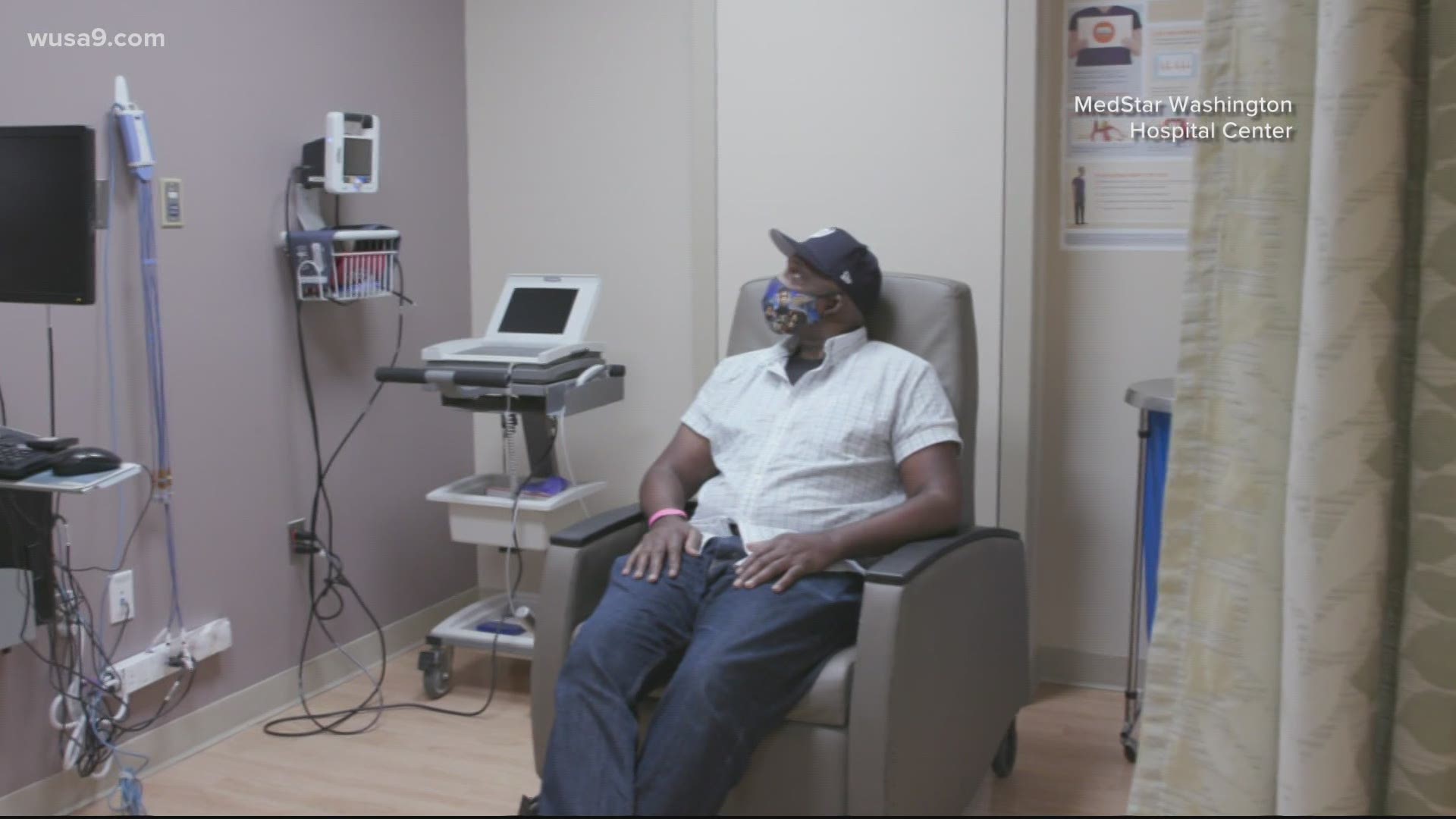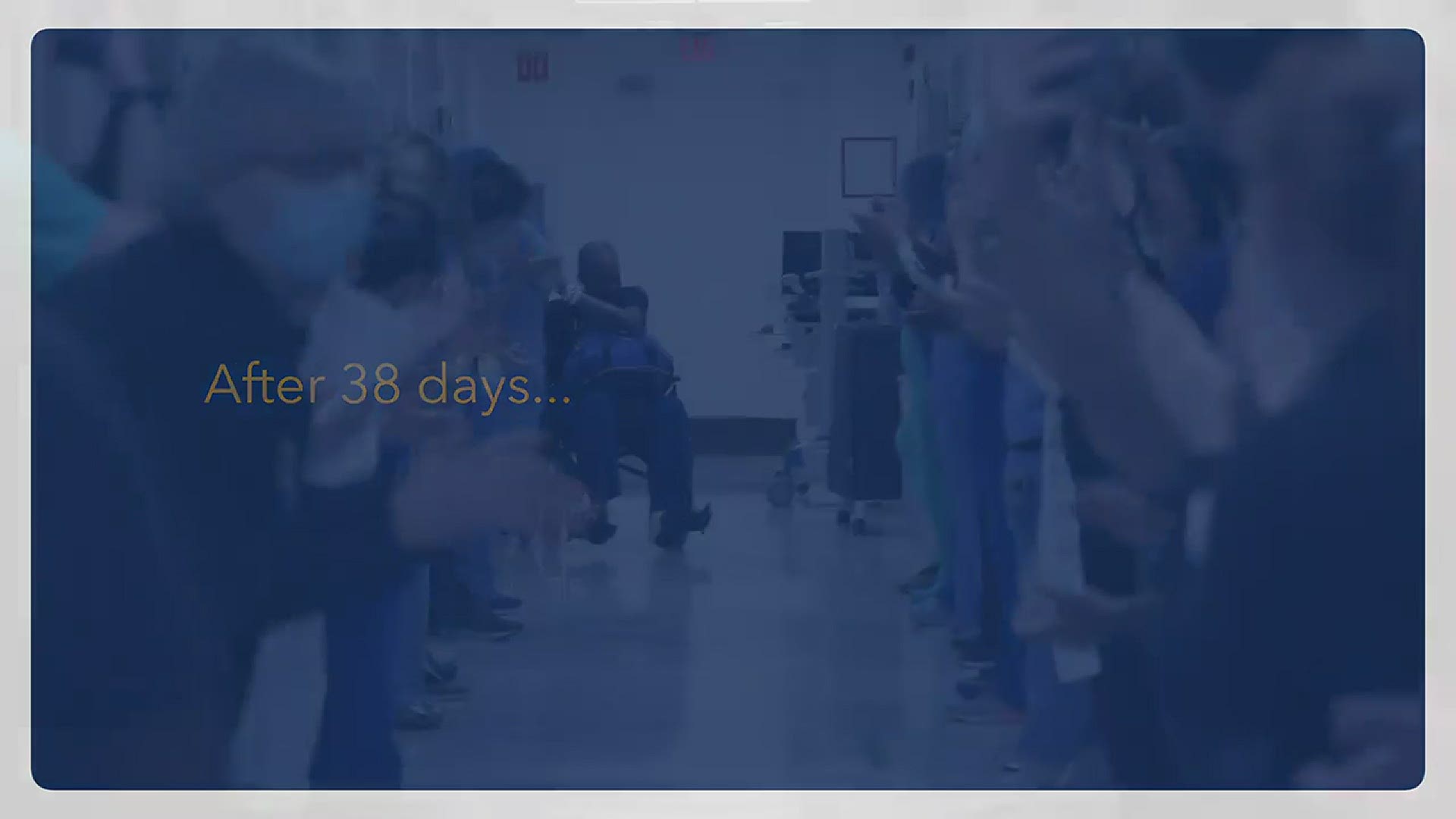WASHINGTON — As the coronavirus continues its spread across the Washington region, local doctors say they are learning more about the long-term effects it leaves on their patients.
Northwest D.C. resident André Taylor admitted himself to Washington Hospital Center March 18 after falling ill from COVID-19.
Taylor said he had a difficult time in the hospital. He said his heart was racing around 160 beats per minute when he first received professional care.
“I was in a coma for a long state,” he said. “I believe 21 days or so.”
Taylor was placed on a ventilator for several days. But he said he turned a corner when he heard a reporter on television recall their own journey battling the coronavirus.
“He specifically said, ‘I will not die like this,'" Taylor said. “And that's when I woke up and was like, ‘You know what, me neither.'"
Taylor would eventually leave Washington Hospital Center after 38 days in the care of their medical staff. Nurses and doctors gave Taylor resounding applause on his way out of the facility. One worker even called him the hospital’s "miracle."
“At that point, I just cried,” he said. “I couldn't believe it.”
But Taylor soon learned he was not out of the woods. He said his heart rate accelerated once again at home.
“I realized I could only walk up a flight of steps before noticing my heart racing, you know, like 140 beats per minute,” he said. “I would try to ride a stationary bike and I couldn't ride it for no longer than a few minutes.”
Taylor, who lived an active lifestyle prior to March, said he was diagnosed with an atrial flutter; a medical complication hospital staff said likely resulted from his bout with the coronavirus.
Dr. Cyrus Hadadi, a cardiac electrophysiologist at MedStar Washington Hospital Center, said other people who beat the coronavirus are noticing similar problems. On Wednesday, Hadadi said a young woman with an irregular heartbeat came back to the hospital for assistance as well.
“The heart is the pumping engine for blood and oxygen through your body,” he said. “And, when an irregular heart rhythm leaves it less efficient, you can have all sorts of manifestations.”
Hadadi added it is not uncommon for patients to deal with heart problems while battling the coronavirus.
“About 10 or 15 percent of patients will have cardiac involvement,” he said. “So, that's hundreds of thousands of patients who may have weakened hearts or irregular heart rhythms as a result.”
The medical staff at MedStar Washington Hospital Center recommended Taylor undergo a procedure called a “Catheter Ablation”. The procedure uses radiofrequency energy, like microwave heat, to destroy a small area of heart tissues causing rapid and irregular heartbeats.
Hadadi conducted the procedure on Taylor Sept. 4.
“I think that really sophisticated ablation work like we do here at Washington Hospital Center has come into its own in the past five to 10 years,” he said.
Taylor said he was a bit reluctant at first to have the procedure performed on his heart. Now, he said he is thankful for the suggestion.
“After that procedure, I feel great,” he said. “I wish I had done it sooner.”
President Donald Trump recently tweeted “Don’t let [the virus] dominate your life” while undergoing his own battle with the coronavirus.
Taylor said while the procedure brought his heart relief, he still has some occasional lingering COVID-19 issues, like joint pain, in his feet.
He said, overall, the virus consumed his life quite a bit.
“I haven't been able to return to full-time work,” he said. “I haven't been as mobile as it could be.”
Still, Taylor said he was thankful for the support of his family and the medical staff at MedStar Washington Hospital Center.
“I did receive excellent care with Washington Hospital Center,” he said.
Hadadi said anyone who is experiencing heart problems after beating the coronavirus should go to their primary care doctor and get an electrocardiogram, an EKG, and an echocardiogram, a sonogram of the heart muscle.
He said if the results from either one of those tests come back abnormal, the patient should probably schedule an appointment with a cardiologist or a cardiac electrophysiologist.
“If you feel that something is not right, if you don't have energy, if you can't walk the way that you used to, if you feel like you're more tired more easily," Hadadi said. "All of these could be manifestations of a weakened heart or an irregular heartbeat as a result of COVID.”


